GÓC HỌC TẬP
1.Parts of Speech
| NOUN |
Names word |
| PRONOUN |
Replaces a noun |
| ADJECTIVE |
Describes something |
| VERB |
Is an action or state |
| ADVERB |
Describes a verb |
| PREPOSITION |
Shows relationship |
| CONJUNCTION |
Joins words or clauses |
| INTERJECTION |
Express emotions |
2.Tenses
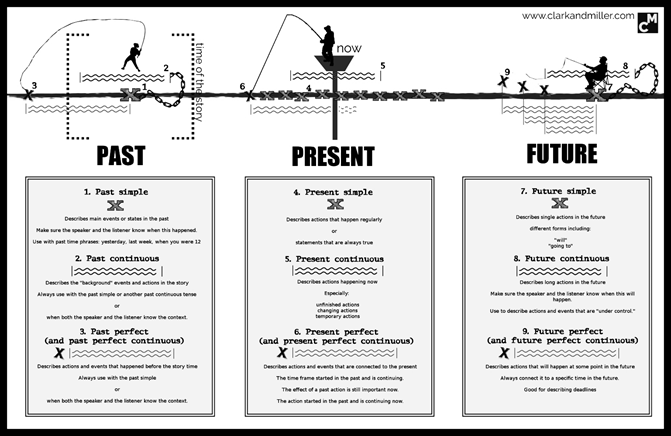
The Simple Present Continuous Tense
The Perfect Present Tense
The Simple Past Tense
The Simple Past Continuous Tense
The Perfect Past Tense
The Future Tense
3.The PASSIVE VOICE
Functions:1.It is used when the person/thing performing the action is unimportant or unknown.e.g. Our car was stolen last night. 2. It is used when it is obvious who/what is performing the action.e.g. Cameron was sacked last week. 3. It is used to describe factual information, especially when describing a process.e.g. The lasagna is baked in an oven for 35 minutes at 250 degrees Celsius. 4. It is used in news reports and to give instructions.e.g. Five people were arrested at a nightclub last night. While it is possible to use this structure in a large variety of tenses in English, it is rare to use the passive in Future Continuous, Present Perfect Continuous, Past Perfect Continuous or Future Perfect Continuous tenses. |
Structures:
I sent Christmas cards to all my friends. (Active) |
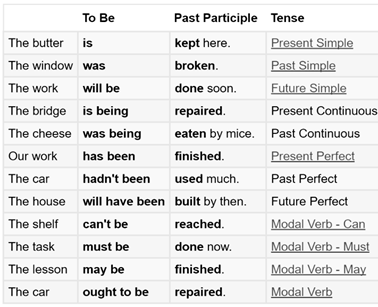 |
Usage of the Passive:
|
4. Subject Verb Agreement
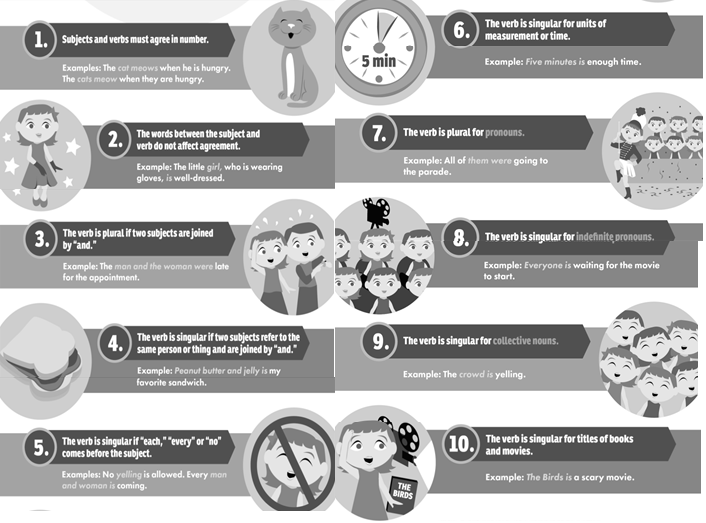
The person and number of the subject of the clause determine the person and number of the verb of the clause. This is called subject–verb agreement or concord:
He hates being in hospital. (third person singular subject + hates)
Not: He hate being …
They don’t do enough art at school.
Not: They doesn’t do …
Some nouns, describing groups of people, can take a singular or plural verb:
The audience was silent, waiting. (or The audience were silent …)
The government does not encourage investment in industry. (or The government do not encourage …)
5. Infinitive and Gerund
What are Gerunds?
A gerund is a verb in its ing (present participle) form that functions as a noun that names an activity rather than a person or thing. Any action verb can be made into a gerund.
Spelling Tip
Verbing (Present Participle)
- Add ing to most verbs. Eg. play > playing, cry > crying, bark > barking
- For verbs that end in e, remove the e and add ing. Eg: slide > sliding, ride > riding
- For verbs that end in ie, change the ie to y and add ing. Eg: die > dying, tie > tying
- For a verb whose last syllable is written with a consonant-vowel-consonant and is stressed, double the last letter before adding ing. Eg: beg > begging, begin > beginning. However: enter > entering (last syllable is not stressed)
Examples
- Gerunds can appear at the beginning of a sentence when used as a subject:
E.g: Jogging is a hobby of mine. - Gerunds can act as an object following the verb:
E.g: Daniel quit smoking a year ago. - Gerunds can serve as an object after a preposition:
E.g: I look forward to helping you paint the house. - Some verbs and verb phrases are directly followed a gerund:
E.g: Paul avoids using chemicals on the vegetables he grows. - Some verbs can be followed by a gerund or an infinitive without causing a change in meaning:
E.g: Some people prefer getting up early in the morning.
Some people prefer to get up early in the morning - Some verbs can be followed by a gerund or infinitive but with a change in meaning:
E.g: He remembered sending the fax.
(He remembered the act of send the fax)
E.g: He remembered to send the fax.
(He remembered the fax and sent it.)
What are Infinitives?
An infinitive is a verb form that acts as other parts of speech in a sentence. It is formed with to + base form of the verb. E.g: to buy, to work.
Examples
- Infinitives can be used as an object following the verb:
E.g: Jim always forgets to eat - Infinitives can be used as a subject at the beginning of a sentence:
E.g: To travel around the world requires a lot of time and money. - Infinitives can be used as an adverb modifying a verb:
E.g:You promised to buy me a diamond ring. - Infinitives can be used as an adjective modifying a noun:
E.g: Tara has the ability to succeed. - Some verbs are directly followed by an infinitive:
E.g: Do you want to call your family now? - Some verbs are directly followed by a noun or pronoun and then by an infinitive
E.g:I convinced Catherine to become vegetarian
He advised me to sell all my shares of stock. - Some verbs can be followed by an infinitive or a gerund without causing a change in meaning:
E.g:Will you continue working after you give birth?
E.g:Will you continue to work after you give birth? - Some verbs can be followed by an infinitive or a gerund but with a change in meaning:
E.g:He stopped drinking coffee. (He never drank coffee again.)
E.g:He stopped to drink coffee. (He stopped what he was doing and drank some coffee.)
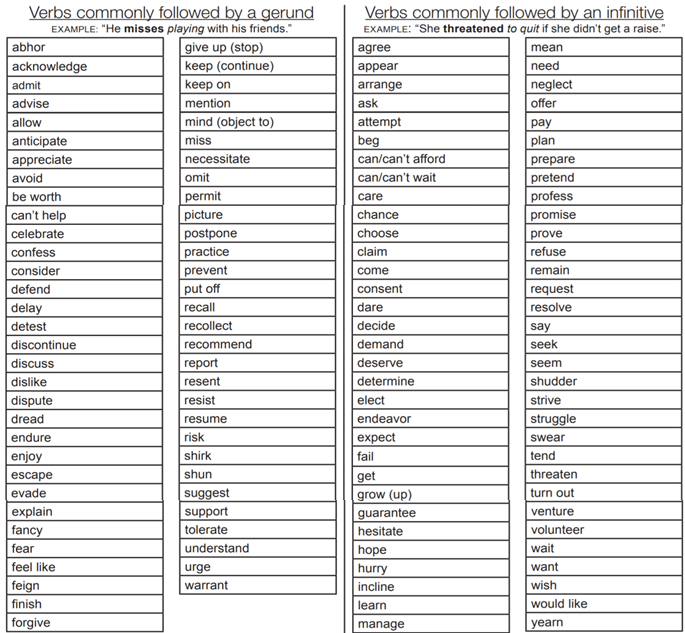
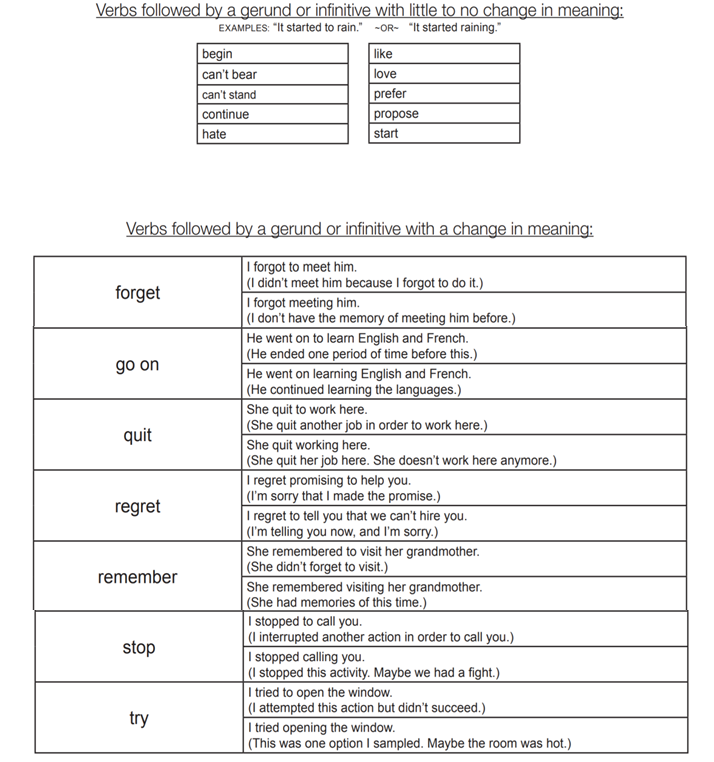
6. Relative Clauses
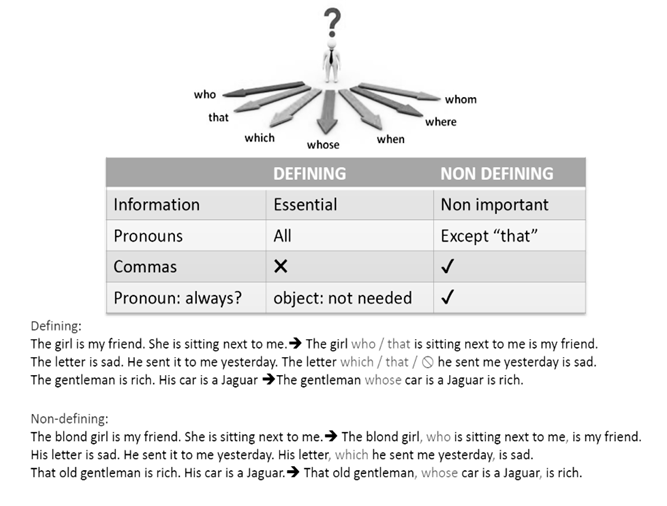
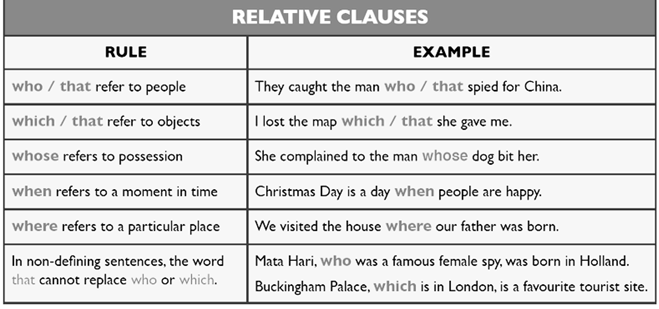
Relative pronouns: who refer to people, and sometimes to pet animals. We use it to introduce defining and non-defining relative clauses:
I think there’d be a lot of children who’d love to have a climbing wall in school. (defining)
That’s the dog who doesn’t like me. (defining; referring to a pet animal)
There’s this guy at work, who’s one of my friends, well he’s never been on a train. (non-defining)
Who can act as the subject or the object of the relative clause:
She’s going out with a bloke who’s in the army. (who refers to a bloke and is the subject of is in the relative clause; bloke is an informal word for a man)
The woman who I saw yesterday was Sheila. (who refers to the woman and is the object of saw in the relative clause)
We can use who as the complement of a preposition:
It was Cath who Ian gave the keys to. It wasn’t me. (who refers to Cath and is the complement of the preposition to)
We put the preposition at the end of the relative clause, and not immediately before who:
Of all my friends, she’s the one who I know I can rely on.
Not: … the one on who I know I can rely.
We often use who with collective human nouns
(e.g. committee, government, group, panel, police, team):
Nicola phoned the fire brigade, who then alerted the police and social workers.
We do not use who for things:
There are some very good art books which you can get ideas from.
Not: There are some very good art books who you can get ideas from.
Relative pronouns: whom use whom in formal styles or in writing to refer to people when the person is the object of the verb. It is much more common in writing than in speaking:
The response of those managers whom I have consulted has been very positive and we are looking forward to meeting together.
The first book was a terrible historical novel for children which was turned down by every publisher to whom it was sent. (whom refers to every publisher and is the complement of the preposition to)
Drama in schools is particularly good for pupils for whom English is a second language.
We put the preposition before whom.
Relative pronoun: whose as a relative pronoun to indicate possession by people and animals. In more formal styles we can also use it for things.
We use whose before nouns instead of a possessive expression (my, your, his, her, its, our, their, x’s) in defining and non-defining clauses:
He’s marrying a girl whose family don’t seem to like him. (The family of the girl he’s marrying don’t seem to like him.)
There was me and there was Kate, whose party it was, and then there were two other people. (It was Kate’s party.)
It is a rambling Tudor house, whose sitting room looks out over a wonderful walled garden. (The sitting room of the house looks out over …)
We can use whose + noun as the complement of a preposition:
Kate, whose sister I used to shared a house with, has gone to work in Australia. (whose sister refers to Kate and is the complement of with)
We can put the preposition immediately before the relative pronoun (more formal written styles) or at the end of the relative clause (more informal).
Relative pronouns: which refer to animals and to things. We use it to introduce defining and non-defining relative clauses. We always use which to introduce relative clauses when they refer to a whole sentence or clause:
- You need to tick the box which says yes. (defining)
- He won’t have much time to prepare for the meeting, which is this afternoon. (non-defining)
- She had to get up and walk all the way to the other side of the room, which isn’t easy with a bad back. (which refers to the whole sentence before it)
We use which or that, not what:
- Another activity which/that I have chosen is photography.
Not: Another activity what I have chosen is photography.
Which can act as the subject or the object of the relative clause:
- The new sports complex, which will be built on the site of the old power station, will provide facilities for cricket, soccer, bowls and badminton. (which refers to the new sports complex and is the subject of will be built in the relative clause)
- It was the same picture which I saw at the National Gallery. (which refers to the same picture and is the object of saw in the relative clause)
We can use which as the complement of a preposition:
- Early in the Autumn Term there is a reception at which you can meet current staff and students.(which refers to a reception and is the complement of at)
- Close by, in the churchyard, is the famous Rudston stone, from which the village takes its name.(which refers to the famous Rudston stone and is the complement of from)
We can put the preposition immediately before the relative pronoun (more formal) or at the end of the relative clause (more informal).
Relative clauses referring to a whole sentence are always introduced by which:
- There’s going to be a new headteacher in September, which is good. It’s time for a change.
Relative pronouns: that use that instead of who, whom or which in relative clauses to refer to people, animals and things. We use it to introduce defining clauses only. That is more informal than who, whom or which:
- We met somebody last night that did the speech therapy course two years after you. (refers to a person)
- The 8.30 is the train that you need to get. (refers to a thing)
- She blamed herself for everything that had happened.
That can act as the subject or the object of the relative clause:
- He finally remembers one lesson that his mum had taught him early – Don’t take money that doesn’t belong to you. (that refers to money and is the subject of belong in the relative clause)
- It’s the same cooker that my mother has. (that refers to the same cooker and is the object of has in the relative clause)
We often use that after superlatives:
- The Wimbledon men’s final was the best game of tennis that I’ve ever seen. That can refer to the complement of a preposition:
- We’ve got some tennis balls that you can play with. (that refers to some tennis balls and is the complement of the preposition with)
Notice:
Unlike which, whom and whose, we can’t use that with the preposition immediately before it:
Not: We’ve got some tennis balls with that you can play.
Relative pronouns: when, where and why use where, when or why to introduce defining relative clauses instead of at which, on which or for which.
| where | places | I know a restaurant where the food is excellent. (… a restaurant at which the food is excellent) |
| when | times | There isn’t a day when I don’t feel rushed off my feet. (… a day on which I don’t feel rushed …) |
| why | reasons | Do you know the reason why the shop is closed today? (… the reason for which the shop is closed …) |
- It gives me a good chance to improve my Italian, which has become a little bit rusty.
Not:
• We don’t use what as a relative pronoun:
- So, he can make himself easily understood in the two languages, which helps a lot.
Not:
• We don’t use who for things:
- She’s written some great cookery books which have got pictures of delicious-looking recipes.
Not:
• Take care to spell which correctly: not ‘wich’.
7. Comparatives and Superlatives
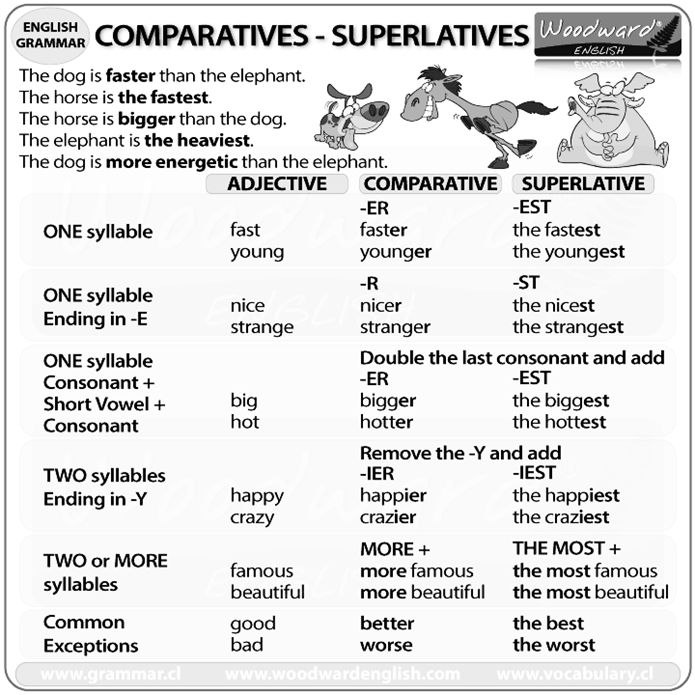
Comparative and superlative adjectives
Comparative adjectives
Comparative adjectives compare one person or thing with another and enable us to say whether a person or thing has more or less of a particular quality:
- Josh is taller than his sister.
- I’m more interested in music than sport.
- Big cars that use a lot of petrol are less popular now than twenty years ago.
Superlative adjectives
Superlative adjectives describe one person or thing as having more of a quality than all other people or things in a group:
- The ‘Silver Arrow’ will be the fastest train in the world when it is built.
- The most frightening film I’ve ever seen was Alfred Hitchcock’s ‘Psycho’.
- What is the least expensive way of travelling in Japan?
Comparative or superlative?
A comparative compares a person or thing with another person or thing. A superlative compares a person or thing with the whole group of which that person or thing is a member:
Joe’s older than Mike. (comparing one person with another)
Sheila is the youngest girl in the family. (comparing one person with the whole group she belongs to)
Comparative and superlative adjectives: form
One-syllable adjectives (big, cold, hot, long, nice, old, tall)
To form the comparative, we use the -er suffix with adjectives of one syllable:
- It’s colder today than yesterday.
- It was a longer holiday than the one we had last year.
To form the superlative, we use the -est suffix with adjectives of one syllable. We normally use thebefore a superlative adjective:
- I think that’s the biggest apple I’ve ever seen!
- They have three boys. Richard is the oldest and Simon is the youngest.
One-syllable adjectives which are irregular
Some one-syllable adjectives have irregular comparative and superlative forms:
1. bad, worse, worst far, farther/further, farthest/furthest
2. good, better, best old, older/elder, oldest/eldest
- The morning flight is better than the afternoon one.
- His elder sister works for the government.
- Olivia is Denise’s best friend.
- I think that was the worst film I’ve ever seen!
- Pluto is the furthest planet from the sun in our solar system.
Two-syllable adjectives
Two-syllable adjectives ending in -y change y to i and take the -er and -est endings:
|
busy, busier, busiest |
happy, happier, happiest |
|
easy, easier, easiest |
funny, funnier, funniest |
We were busier last week than this week.
Are you happier now that you’ve changed your job?
That was the easiest exam I’ve ever taken.
Some other two-syllable adjectives (especially those ending in an unstressed vowel sound) can also take the -er and -est endings:
|
clever, cleverer, cleverest |
quiet, quieter, quietest |
|
narrow, narrower, narrowest |
simple, simpler, simplest |
I’ve always thought that Donald was cleverer than his brother.
This new bed is narrower than the old one.
The guest bedroom is the quietest room in the house because it overlooks the garden.
We don’t normally use the -er and -est endings with two-syllable adjectives ending in -ful. Instead, we use more and most/least:
This dictionary is more useful than the one we had before.
Not: This dictionary is usefuller …
You’ll have to try to be more careful in future.
The most useful tool in the kitchen is a good sharp knife.
Not: The usefulest tool in the kitchen …
This is the least harmful chemical in terms of the environment.
Longer adjectives
Adjectives of three or more syllables form the comparative with more/less and the superlative with most/least:The second lecture was more interesting than the first.
Not: The second lecture was interestinger …
That way of calculating the figures seems less complicated to me.
London is the most popular tourist destination in England.
Not: London is the popularest …
If you are going as a group, the least expensive option is to rent an apartment or villa.
Comparative adjectives: using much, a lot, far, etc.
We can strengthen or emphasise a comparative adjective using words such as much, a lot, far, even or rather, or by using than ever after the adjective:
This food is much better than the food we had yesterday.
The town is a lot more crowded these days because of the new shopping centre.
Alex is far less intelligent than the other kids in the class.
We’ve been busier than ever at work this last month or so.
We can soften a comparative adjective using a little or a bit. A bit is less formal:
She feels a little more confident now that she’s given her first public performance.
or She feels a bit more confident … (less formal)
Comparative adjectives: using than
We use than when we mention the second person or thing in the comparison. If the second person mentioned takes the form of a personal pronoun, we normally use the object form of the pronoun (me, you, him, her, us, them):
Could you carry this? You’re stronger than me.
Not: You’re stronger than I.
Why did you choose Robert? Marie is more experienced than him.
In more formal situations, instead of than + object pronoun, we can use than + subject pronoun + be:
You managed to answer the ten questions correctly? Well, you’re definitely cleverer than I am!
I preferred Henrietta to Dennis. She was always more sociable than he was.
Comparative adjectives: -er and -er, more and more
To talk about how a person or thing is changing and gaining more of a particular quality, we can use two -er form adjectives connected by and, or we can use more and more before an adjective. We don’t follow such comparisons with than:
The weather is getting hotter and hotter.
I’m getting more and more interested in conservation these days.
Comparative adjectives: the -er, the -er and the more …, the more …
If a person or things gains more of a particular quality and this causes a parallel increase of another quality, we can repeat the + a comparative adjective:
The colder it is, the hungrier I get. (as the weather gets colder, I get hungrier)
The more generous you are towards others, the more generous they are likely to be towards you.
Reduced forms after comparatives
After than, we often don’t repeat subject pronouns with impersonal subjects, or auxiliary verbs with passive voice verbs:
The exam results were better than predicted. (preferred to … better than people predicted.)
Temperatures that summer were higher than previously recorded. (preferred to … than were previously recorded.)
Less and not as/not so with comparatives
We use less with longer adjectives (interesting, beautiful, complicated), but we don’t normally use lesswith short adjectives of one syllable (big, good, high, small). Instead we use not as … as …, or not so … as … Not as is more common than not so:
The second method was less complicated than the first one.
This new laptop is not as fast as my old one. I’m sorry I bought it now. (preferred to is less fast than my old one.)
Prepositions after superlative adjectives
We don’t normally use of before a singular name of a place or group after a superlative adjective:
The castle is the oldest building in the city.
Not: The castle is the oldest building of the city …
She’s the youngest musician in the orchestra.
However, we can use of with a plural word referring to a group:
All the sisters are pretty, but Sarah’s the prettiest of them all.
The with superlative adjectives
When a superlative adjective is followed by a noun, we normally use the:
This is the best meal I’ve had for a long time.
Not: This is best meal …
In informal situations, we can often omit the after a linking verb (be, seem) or a verb of the senses (look, taste) if there is no noun:
[talking about sweaters in a shop]
They’ve got them in red, green or grey. Which looks best?
If you want to get a message to Peter, email is quickest. He never answers the phone.
Other determiners with superlative adjectives
Before a superlative adjective, we can use a possessive determiner (my, his, their), or the + a number (two, three, first, second), or a possessive determiner + a number:
My worst score ever in an exam was zero. I just couldn’t answer any of the questions.
Birmingham is the second biggest city in England.
His two best friends organised a surprise party for him on his fortieth birthday.
Emphasising superlative adjectives
We can make a superlative adjective stronger with by far, easily or of all:
The Beatles were by far the most successful rock band of the 1960s.
This method is by far the least complicated.
She’s easily the best dancer in the group. No one is as elegant as her.
There were a number of excellent poems entered for the competition, but the best poem of all was written by a ten-year-old boy.
In more formal situations, we can use quite:
This is quite the most irresponsible behaviour I have ever seen.
To-infinitives after superlative adjectives
We can use a to-infinitive after a superlative adjective, with a meaning similar to a relative clause with who, which or that:
Who was the oldest person to compete in the London Marathon of 2008? (Who was the oldest person who competed …?)
The Golden Swan was the largest sailing-ship ever to be used in battle.
See also:
• Relative clauses
Comparative adjectives: typical errors
• A comparative adjective is followed by than, not that or as:
The next hotel we tried was more expensive than the first one.
Not: … more expensive that the first one … or …more expensive as the first one …
• After a superlative adjective, we don’t normally use of before a singular name of a place or group:
She was the tallest girl in the team.
Not: She was the tallest girl of the team.
• We use the superlative, not the comparative, when we compare more than two people or things:
Which is the city’s biggest hotel?
Not: … bigger hotel
Adverbs: comparative and superlative forms
Adverbs do not normally change in form, but a few have comparative and superlative forms. These are usually short adverbs and so they normally have comparative and superlative forms with -er and -est.
Some of the most common comparative and superlative adverbs are:
|
soon sooner soonest |
fast faster fastest |
|
hard harder hardest |
near nearer nearest |
|
early earlier earliest |
far farther/further farthest/furthest |
|
late later latest |
|
Teachers always say that students must work harder.
The kids were playing in the garden, seeing who could jump highest.
Warning:
We don’t use more or most together with an -er or -est ending:
Children learn things faster than adults.
Not: … more faster than adults.
Who ran slowest in the race?
Not: Who ran most slowest
Adverbs with more and most
Adverbs with two or more syllables form the comparative and superlative with more and most:
We need to treat the environment more carefully.
It was the most beautifully designed chair.
Comparative adverbs: using than
When we mention the second person or thing in the comparison, we use than. We do not use that or as. If the second person mentioned takes the form of a personal pronoun, we normally use the object form of the pronoun (me, you, him, her, us, them):
I can’t keep up with him – he runs much faster than me.
Not: faster that me or faster as me
In more formal situations, instead of than + object pronoun, we can use than + subject pronoun + be, do or a modal verb:
My wife drives more carefully than I do.
She can read music much more quickly than I can.
Well and badly
The adverb well has the same comparative and superlative forms as the adjective good (better, best). The adverb badly has the comparative and superlative forms worse, worst:
[talking about playing tennis]
I played better yesterday but I need to improve my serve.
A lot of people behaved badly at the party, but she behaved worst of all.
7. Comparatives and Superlatives
Equal comparisions
Equal comparisions have this formation “as + positive adjective/adverb + as”. The use of an adjective or an adverb depends on the kind verb which is used in the sentence. In other words, be requires an adjective and an ordinary verb normally requires an adverb.
A. Be + as + adjective + as
The reviewers agreed that the data presented in the report was as reliable as other data they tested.
B. Ordinary verb + as + adverb + as
The existing treatment facility enables us to process waste water as efficiently as possible.
C. Almost/nearly/just modify a positive adjective or adverb.
John is just as qualified as the other candidates for that position.
Comparatives
Comparatives are used to compare two things.
A. Adjective/adverb + -er + than
Given the high price of gasoline lately, renting a car is not cheaper than taking the train.
B. More + adjective/adverb + than
Ever since the office switched from carpeted floors to linoleum floors, the janitors have been able to clean the office more easily than before.
Superlatives
A. The + adjective/adverb + -est To cease smoking is the easiest thing I ever did. B. The + most + adjective/adverb That was the most boring movie I’ve ever seen.
Comparatives with “the”
Generally, the is not used with comparatives, but two cases exist in which the must be used.
A. The + comparative, the + comparative
The closer you live to a city, the more expensive your home insurance premiyms will be.
B. Of the two + noun, subject + verb + the + comparative
One the two candidates, John is the better qualified for that job.
Comparatives of words with Latin roots
To is used instead of than with then adjectives.
| Inferior to | junior to | posterior to | prefer to |
|---|---|---|---|
| Prior to | senior to | superior to |
He pointed out that the former was inferior to the latter in some respects. You should arrive at least one hour prior to boarding. Our new line of products is far superior to existing lines.
Adverbs used to emphasize comparatives and
superlatives
Below are some adverbs used before comparatives and superlatives for emphasis.
much/by far/a lot/even/far/still/ a little
This year’s college football game was far more exciting to watch than last year’s.
Attendance figures of the new employees at the staff meeting are much higher than expected.
Idiomatic comparative expressions
The following comparative expressions are commonly used and may be a bit confusing. Study them carefully.
| no longer than | no sooner – than |
|---|---|
| no more than | rather than |
| no later than | would rather – than |
| other than | at the latest |
As announced at this morning’s meeting, this year’s appraisal forms have to be filled out and retured to the personal departure no later than June 30.
Irregular comparisions
Get used to following irregular comparisions:
| Positive | Comparative | Superlative |
|---|---|---|
| good well |
better | best |
| bad ill |
worse | worst |
| many much |
more | most |
| little | less | least |
I like your interpretation better than mine
8. Conditionals - IF Clauses
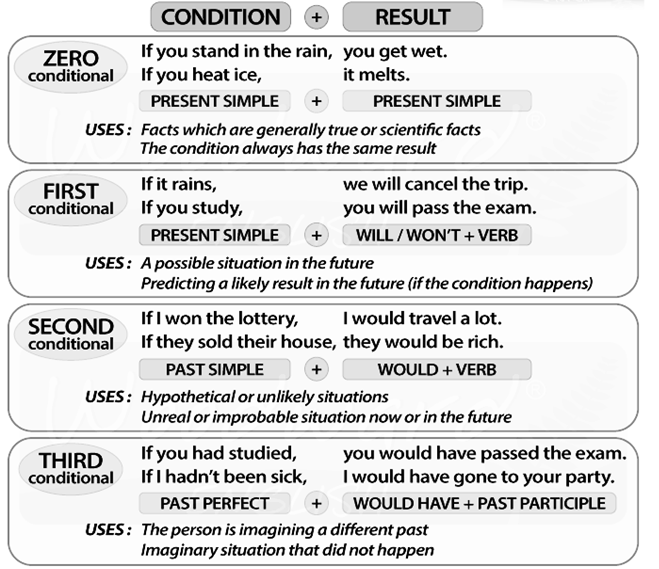
Zero Conditional
If + Present Simple, Present Simple
Present Simple + If + Present Simple
• If you put water in the freezer, it becomes ice.
• You get wet if you stand in the rain.
• If you heat ice, it melts.
First Conditional
Present Simple + If + Present Simple
• Ice melts if you heat it.
• I can't sleep if I drink coffee at night.
If + Present verb, future verb
• If you touch that wire, you will get an electric shock. (Warning)
• If you eat my chocolate that is in the fridge, you'll sleep outside with the dog.(Threat)
Future Verb + If + Present Simple
• I will be annoyed if they don't arrive on time.
• You will get a better job if you can speak English.
Modal Verbs in First Conditional
Normally WILL is used in the main clause of first conditional sentences. However you can also use the modal verbs MAY, MIGHT and COULD when something is a possible consequence (and not a certain one) in the future.
• If you are nice to me, I may buy you a gift when I'm in Peru.
• If they train a little harder, they might win the match.
• If he doesn't do his work, he could get fired.
Second Conditional
We use a past verb though are imagining the present or the future to be different.
The second clause of subject + would + verb (conditional verb) is conditional to the first clause happening (or will only happen if the first part/clause happens).
Example: If I won the lottery, I would travel around the world.
= It is unlikely that I will win the lottery, but I'm going to hypothetically imagine that I did win. In that situation I would travel around the world. So in order for me to travel around the world, I would need the first clause (the condition or situation) to happen, that is, for me to win the lottery first.
• If I knew his name, I would tell you.
• If I didn't have a headache, I would go to the party.
• If I became President, I would reduce the salaries of all politicians. (Though it is unlikely I will become President)
Conditional verb (would + verb) + If + Past Simple
• I would be happy if I had more free time.
• There would be fewer accidents if everyone drove more carefully.
If I were ...
Note that with the verb To Be we use IF + I / HE / SHE / IT + WERE
• If he were taller, he'd be accepted into the team.
• She would be still be correcting my grammar if she were still alive.
Could in Second Conditional sentences
COULD can be used instead of WOULD to make the hypothetical present or future more likely.
• If he trained every day, he could represent his country
• If I had a little more money, I could buy a car.
Third Conditional
When we are talking about something in the past which cannot be altered now, we use:
If + Past Perfect, would have + past participle
EXAMPLE: If you had studied all of these grammar pages, you would have passed the exam.
You can not alter or change the past. You didn't study in the past (something you cannot change now) so you didn't pass the exam. It is an imaginary situation that didn't happen.
• If you had been more careful, you wouldn't have had an accident.
• If I had seen you, I would have said hello.
Notice how this tense can be used to say that you regret doing something or when you are telling someone off (reproaching someone). This type of conditional can also be used when making excuses.
We can also change the word order of the sentence...
Would have + If + past perfect
EXAMPLE: You would have passed the exam if you had studied all of these grammar pages.
• I wouldn't have left my job if I had known how difficult it is to find another one.
• I would have taken a photo if I had brought my camera with me.
• He would have died if the ambulance hadn't arrived quickly.
• She would have gone to your birthday party if she hadn't been sick.
• He wouldn't have become lost if he had taken the map with him.
• The team would have won if the referee hadn't taken the bribe.
• You wouldn't haved needed fillings if you had brushed your teeth more frequently.
If I were you ... is used when giving ADVICE about what you would do in the same situation as the other person. You imagine yourself in their position or situation and what you would do or how you would react.
• If I were you, I would study more.
• If I were you, I would stop doing that.
• If I were you, I would go to the doctor.
• if I were you, I would subscribe to the Woodward English YouTube channel right now. :)
• If I were you, I wouldn't play with those wires.
Though in informal (and grammatically incorrect) English, you may hear some people say If I was... This usage doesn't sound good, so avoid it.
You can also change the order of the sentence
• I would study more if I were you.
• I would be more careful if I were you.
• I wouldn't do that if I were you.
Notice how the comma is not necessary with this word order.
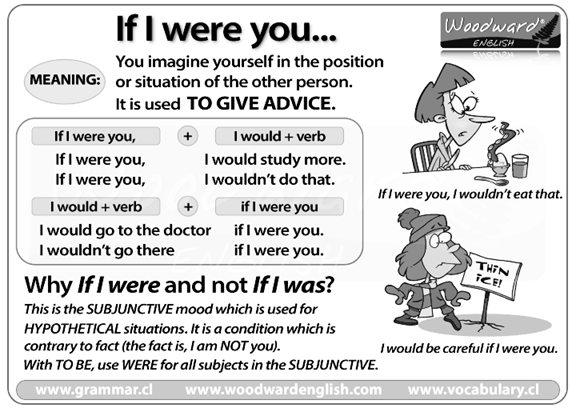
Quick Explanation
The difference between All, Every, and Each
All means the total number of people or things considered as a group.
Every means all members of a group considered individually.
Each means all members of a group considered individually though we think of them more one by one
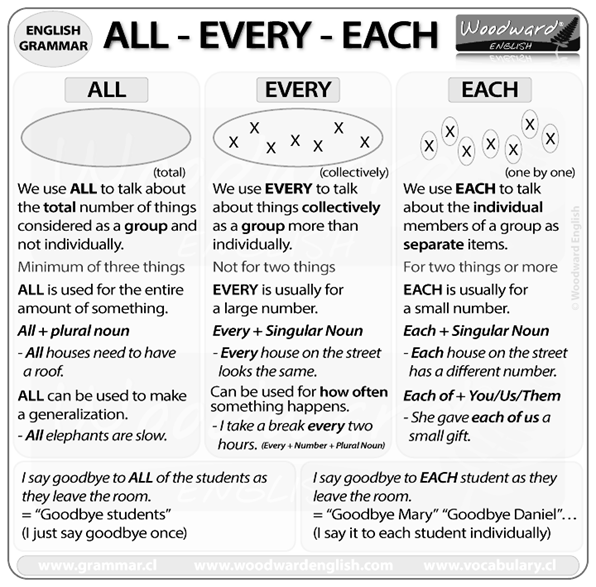
-- EVERY --
Every refers to all members of a group though considered individually. It can be used to talk about three or more people/things.
Every + singular noun
The noun that comes after Every is in singular form.
• I have visited every country in South America (we do NOT say: every countries)
• I can understand every word our teacher says. (we do NOT say: every words)
Note, when you use every + noun as a subject, it uses a singular verb (verb + s)
• Every day is a chance to learn something new.
• Every child needs love and care.
• Every house on the street looks the same.
Every + number + plural noun
Every can be followed by a plural noun when there is a number before that noun. This is common with periods of time or things at regular intervals.
• He gets his head shaved every three weeks.
• You need to take a break every two hours.
We can also use every without a number and a singular noun to refer to regular intervals:
• He plays football every Saturday.
• She goes to the gym every day.
-- EACH --
Each refers to all members of a group though we think of them more one by one (individually). Each can be used to talk about two or more people/things.
Each + singular countable noun
You use a singular (countable) noun after the word Each.
• Make sure you enjoy each moment in your life.
• They play the national anthem of each country before the game begins.
• Live each day as if it were your last.
Each + one
One can be used to replace the singular countable noun if it has already been mentioned.
• A: What do I have to do with these antique vases? B: You need to take each one out of the box very carefully. (each one = each vase)
Each of + determiner + plural noun
Each can be followed by a determiner (my, his, the, etc.) and a plural noun.
• I kiss each of my children before they go to bed at night.
• The teacher had a little kid holding on to each of her hands.
• Each of the guides has a different group to show around the museum.
Notice how after each of the verb usually in singular form is though when speaking informally, you will sometimes hear a plural verb used.
• Each of my students has a different assignment to complete. (correct use)
• Each of my students have a different assignment to complete. (informal use)
Each of + pronoun (you/us/them)
We can only use the pronouns you/us/them after each of.
• He gave each of us a small gift at the end of the course.
• You need to wash each of them before use.
• Each of you needs to complete the assignment individually.
Again the verb following each of + pronoun should be in the singular form.
Each as a pronoun
Each can be used by itself (without a noun) as a pronoun. • When the students finished to course, each was given a certificate. (Each = each of the students) Though it is more common to use each one instead of each by itself. • …each one was given a certificate
Noun/Pronoun + each
Each can be used after the noun (or pronoun) it describes.
• The parents gave their children some pocket money. To avoid problems, they each received the same amount.
Auxiliary Verb/To Be + each
Each can be used after an auxiliary verb or the verbs Are and Were.
• I have four books to sell and they are each worth around five dollars.
• They have each been told their responsibilities.
Object + each
Instead of going before/after the subject, each can appear after the object.
This is common when the noun object refers to an amount, how many of something there is or when giving a price.
• My paintings are worth $100 each (= Each of my paintings are worth $100)
• I gave my children each an ice cream.
-- ALL --
All refers to the total number of people or things of a group. They are considered as a group and not individually. There are minimum three things in the group.
All + noun
We can use All with a plural noun to make a generalization about an entire group of something.
• All sharks are dangerous.
• All elephants are slow.
All + of + determiner + noun
The noun can be singular, plural or an uncountable noun. These nouns can also be replaced by pronouns.
• You need to read all of the book.
• All of the pages are yellow and old.
• All of the fish in the pond have died.
• You need to remove all of them before they start to smell bad.
Note that All of + singular noun is not common and Whole or Entire used instead of all of.
• You need to read the whole book (= all of the book)
We can also remove OF before the determiner + noun (but we must use OF before a pronoun)
• You need to read all the book.
• All the pages are yellow and old.
Pronoun + all
Sometimes you can place All after a pronoun to emphasize that every single one of that group is included.
• We all hope you get better soon.
• I hope you all have a great time.
• I have made us all some sandwiches.
The difference between Another vs. Other vs. Others
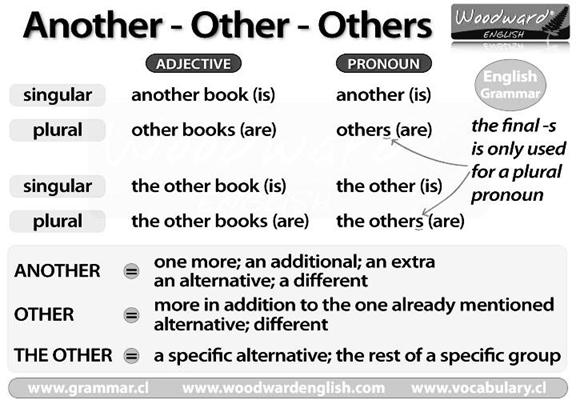
-- ANOTHER--
Another means:
• one more, an additional, an extra
• a different one; an alternative one
Another is a determiner (and a qualifier) that goes before a singular countable noun or a pronoun.
Another + Singular Countable noun
Another can be followed by a singular countable noun.
• He has bought another motorbike.
• Would you like another cup of coffee?
• Don’t worry about the rain. We can go another day.
• I think you should paint it another color.
• We are having another baby.
Another + One
Another can be placed before “one” when the meaning is clear from the text before it.
• I have already eaten two sandwiches though now I want another one. (= an additional sandwich)
• A: You can borrow more of these books if you like. B: Ok, I’ll take another one. (= another book, one more book)
Another as a pronoun
Sometimes another is used as a pronoun.
• That piece of cake was tasty. I think I’ll have another. (another = one more piece of cake)
• I don’t like this room. Let’s ask for another. (another = another room)
Note: you can also say: “I think I’ll have another one.” and “Let’s ask for another one.”
Another + number + plural noun
Another can be used before a plural noun when there is a number before that noun or before phrases such as a couple of, a few etc.
• In another 20 years my laptop is going to be obsolete.
• I like this city so much that I’m going to spend another three days here.
• We need another three teachers before classes begin.
• He was given another couple of months to finish the sculpture.
Remember another is ONE word not two words (an other is incorrect)
-- OTHER--
Other is a determiner that goes before plural countable nouns, uncountable nouns or a pronoun.
Other + Plural Countable Noun
Other can be followed by a plural countable noun.
• We have other styles if you are interested.
• Have you got any other dresses, or are these the only ones?
• Some days are sunny though other days can be very rainy.
• I have invited some other people.
• I can’t help you because I’m busy with other things.
Other + Ones
Other can be placed before the pronoun “ones” when the meaning is clear from the text before it.
• We don’t need those books, we need other ones. (= different books)
• A: You can borrow my books if you like. B: Thanks, but I need other ones. (= other books)
Note: you can say other one when it refers to wanting the alternative.
• I don't want this one, I want the other one.
-- OTHERS--
Others as a pronoun
Others replaces “other ones” or "other + plural noun".
Only others can be used as a pronoun and not other.
• I don’t like these postcards. Let’s ask for others. (others = other postcards)
• Some of the presidents arrived on Monday. Others arrived the following day.
Others - the others
Often “(the) others” refers to “(the) other people”.
• He has no interest in helping others. (= in helping other people)
• What are the others doing tonight?
The difference between The Indefinite Article – A / AN
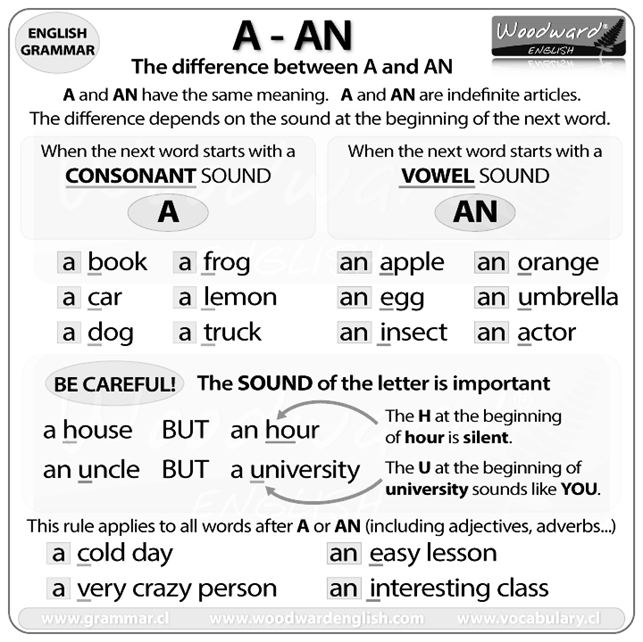
We use A/AN with:
1. Singular nouns and the first time we refer to a person, animal or thing.
• a child
• an elephant
• a television
2. We don't use A/AN with possessive pronouns, demonstratives or cardinal numbers.
• My shirt is dirty.
• This car is expensive.
• One person is in the reception.
3. We use ONE (or more) instead of A/AN when the number is important.
• There is only one exit from the airport.
A or AN?
A is used when the next word begins with a consonant sound (b, c, d, f, g, h, j, k etc).
• a book
• a table
• a clock
• a university (because the beginning of university sounds like YOU-niversity)
AN is used when the next word begins with a vowel sound (a, e, i, o, u).
• an apple
• an elephant
• an umbrella
• an hour (because the H is silent)
The Definite Article – THE
We use THE with:
1. A singular or plural noun when it is clear/obvious which person or thing we are talking about.
• There is a lamp in my bedroom. (we mention the lamp for the first time)
• The lamp is next to the desk.
2. Anything which we identify immediately.
• We watched the new Brad Pitt movie last night.
3. Musical instruments (the violin, the guitar, the drums, the flute, the piccolo).
• She plays the piano.
4. Something that is unique or there is only one.
• the sun
• the moon
• the internet.
5. Names of rivers, seas, oceans, mountain ranges and deserts (always in capitals).
• The Mississippi River
• The Black Sea
• The Andes
• The Sahara Desert
6. Directions (cardinal points).
• the west
• the south-east
• the north-west.
No Article
We use no article with:
1. When we refer to general ideas, plurals or uncountable nouns we do not use THE.
• Religion is an important issue. (NOT The religion is an important issue)
• Mexican food is spicy. (NOT The Mexican food is spicy).
2. Names of people, books and plays (unless it is part of the title).
• I have read Romeo and Juliet.
3. Towns, cities, states and countries.
• Cape Town
• Montana
• Vietnam
(Exceptions – The USA, The UK, The Netherlands, The Czech Republic, The Philippines).
4. Lakes, single islands, continents or mountains.
• Lake Victoria
• Jamaica
• Asia
• Mt Fuji
5. Planets
• Mars
• Jupiter
• Saturn
6. Sports or games
• soccer
• tennis
• skiing
• monopoly
7. Meals
• breakfast
• lunch
• dinner
• supper
The difference between Both – Either – Neither
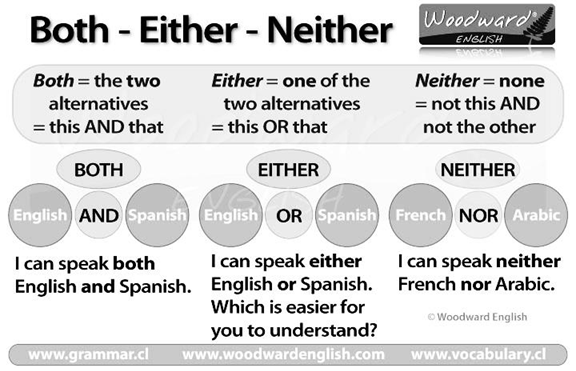
We use both, either and neither to refer to two people or things.
--BOTH--
Both = the two; that one AND the other one; this one AND that one
Both can be used as a pronoun to refer to two things that we have already mentioned.
• A: Do you want the blue shirt or the red one?
B: I’ll buy both (= the blue shirt AND the red shirt = both shirts)
Both X and Y
= not only X but also Y
Both + Adjective + and + Adjective
• He’s both tall and handsome.
• I’m both happy and confused at the same time!
• I have had a long, hard day and I’m both tired and hungry.
Both + Noun + and + Noun
Both can be used with a singular noun + and + singular noun
• She speaks both English and Arabic.
• They have both a cat and a dog.
• He is both an actor and a director.
We can also use Both + plural noun (see more below)
• She speaks both languages.
Both or Both of?
Both or Both of can be used without a difference in meaning though Both of is more common in the United States
Both (of) + determiner + plural noun
You can use Both or Both of before a determiner (my, his, these, the etc.) and a plural noun.
• Both (of) my friends arrived late to class.
• Both of the wheels wobble too much.
• A prize was given to both of the players.
When we use Both (without of), we drop the article the.
• Both of the parents were nervous.
• Both parents were nervous.
Both of + Object Pronoun
When using Both with an object pronoun (me, you, him, her, it, us them), we need the preposition OF before that pronoun.
• He has invited both us. (incorrect)
• He has invited both of us. (correct)
• I’ll take both of them. (correct)
• I need to speak to both of you. (correct)
Verb + Object pronoun + both
We can use both after an object pronoun
• I hope they invite us both (= I hope they invite both of us)
• Do you need them both? (= Do you need both of them)
• The teacher sent them both to the principal’s office.
To be + both
Both comes after To Be (or an auxiliary such as have or modal verbs).
• He is both intelligent and agile.
• My sister and I are both ready for the trip.
• We were both happy with our exam results.
Modal verb + both + verb
• My parents can both speak French. • They should both try harder. • My brothers would both be shocked if they knew the truth.
Both + other verbs
Both goes before the other verbs. If there is an accompanying auxiliary verb, then it goes in the middle of the two verbs (i.e. auxiliary + both + verb)
• We both wanted to stay in bed and not go to work.
• They both liked the surprise.
• My parents both work in the same building.
• They have both studied a lot.
Both - Negative
We don’t use both in negative structures. Instead, we normally use Neither.
• We don’t say: Both of them are not ready (incorrect)
• We say: Neither of them are ready (correct)
--NEITHER--
Neither = not one and not the other
Neither is a negative word and is accompanied by an affirmative singular verb.
Neither X nor Y
Neither … nor … is used as a conjunction. It is the opposite of “Both … and …” If a verb comes after this phrase, that verb is in the singular form (Sometimes you will hear it used in the plural form though it is not grammatically correct)
• Neither John nor Fred likes doing the dishes. (= “Both John and Fred don’t like doing the dishes”)
• I want neither the red shirt nor the blue shirt.
• I neither smoke nor drink.
Neither + singular noun
Neither is used as a determiner before a single noun.
• Neither team wanted to lose.
• That tennis game was very close. Neither player had a clear advantage.
• Neither parent knew about the accident.
Neither of + determiner + plural noun
You can use Neither of before a determiner (my, his, these, the etc.) and a plural noun.
• Neither of my friends came to class today.
• Neither of the parents understood what the baby was trying to say.
• Neither of our cars has enough petrol so we have to take the bus.
Neither of + Pronoun
When using Neither + of + pronoun (you, us, them), we need the preposition OF before that pronoun. (If a verb comes after this phrase then it is in singular form) • The present is for neither of us. • Neither of them is married. • Neither of us expected to be fired.
Neither in short responses
Neither is frequently used as part of a short response when someone says something negative and you agree with them.
• A: I have never been to Switzerland
• B: Neither have I.
• A: I don’t want to go.
• B: Neither do I.
Neither can also be used alone.
• A: Would you like a blue tie or a green tie?
• B: Neither. (= Neither tie)
Neither vs. Either
You can use Either with a negative verb to replace Neither with a positive verb
• I have neither time nor money
• I don’t have either time or money.
--EITHER--
Either = any one of the two = this one or the other one
Either is accompanied by an affirmative singular verb and is mostly used in questions or negative sentences
Either X or Y
Either … or … is used as a conjunction. It is used to express alternatives and or a choice between two (and sometimes more) things. It is used a verb in singular form (Sometimes you will hear it used in the plural form though it is not grammatically correct).
• Either you or John has to finish the report before 5pm.
• You can have either the red shirt or the blue shirt. (= but not both)
• Either you leave the building now or I call the security guards.
Either + singular noun
Either is used as a determiner before a single noun.
• There are only two options and I’m not interested in either film.
• A: Do you want it ready for Thursday or Friday? B: Either day is fine for me.
Either of + determiner + plural noun
You can use Either of before a determiner (my, his, these, the etc.) and a plural noun.
• We’ve been dating for 6 months and I haven’t met either of her parents.
• I haven’t read either of these books.
• I don’t want either of those apples. Do you have one that is not rotten?
Either + of + Pronoun
When using Either + of + object pronoun (you, us, them), we need the preposition OF before that pronoun.
• I don’t think he is going to invite either of us.
• A: Which photo do you prefer? B: I don’t like either of them
• I think I left my keys and wallet at the office. I don’t want to lose either of them.
Either can also be used alone. It means it doesn’t matter which alternative. Sometimes it is accompanied by the pronoun “one”.
• A: Would you like a coffee or a tea?
• B: Either (one). (= I don’t mind if it’s coffee or tea, both alternatives are fine)
Either in short responses
Either can be used at the end of a negative sentence when you agree with something negative someone else has said. It is similar to meaning TOO and ALSO (which are used in affirmative sentences).
• A: I wasn’t thirsty. B: I wasn’t either. (You cannot say “I wasn’t too”)
• A: I’ve never been to Portugal. B: I haven’t either.
• A: I didn’t go to class yesterday. B: I didn’t either
Pronunciation of Either and Neither
You will hear the word Either pronounced two different ways:
• /ˈaɪðər/ (eye-ther – with a long I sound at the beginning) – British English
• /ˈiːðər/ (ee- ther – with a long E sound at the beginning) – American English
Both forms of pronunciation are correct and supposedly one is British English and the other American English. However within each country you may hear both forms used.
The same happens with the pronunciation of the word Neither:
• /ˈnaɪðər/ – British English
• /ˈniːðər/ – American English
The difference between Everyday and Every day.
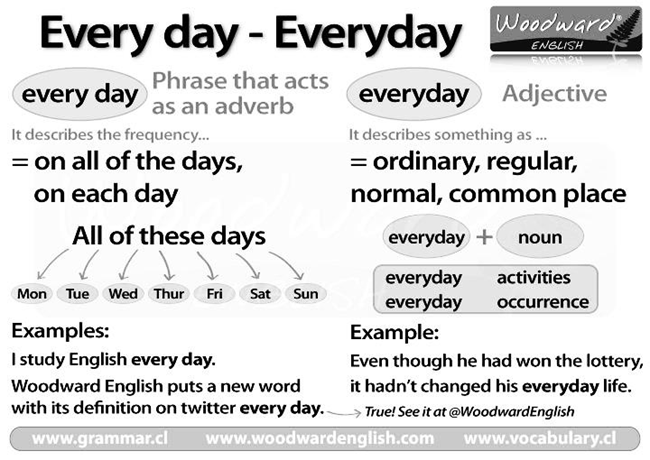
A common mistake in English is the correct use of the words everyday and every day. Don't worry, this is also a mistake commonly made by native speakers too.
The word everyday (one word) and phrase every day (two words) are not interchangeable.
Everyday is an adjective so it goes before the noun it describes.
Everyday = ordinary, regular, normal or commonplace. It can refer to something done or used daily or routinely.
• You should wear an elegant dress for the wedding, not just an everyday one.
• Even though he has won some money, it hasn't changed his everyday life.
• Some everyday activities damage the environment.
• Why do you always use those big words that are not common in everyday language?
Every day is a phrase that usually acts as an adverb.
Every day = all of the days or each day over a period of time. It can also mean very regularly.
• You've been wearing that same shirt every day this week. You need to change it!
• You should take a shower every day.
• Low prices, every day! (A sign in a shop)
• Woodward English publishes new material on Twitter every day.
How to know when to use every day or everyday.
To know which of the words to use in your sentence, replace the word(s) with each day.
If it sounds correct, then write every day (two words).
If it doesn't sound correct (usually because it is before a noun) then use everyday(one word).
For example:
• I do exercises every day. (correct)
• I do exercises each day - This sound correct so we use every day (two words)
• It's not an every day event. (incorrect)
• It's not an each day event. - This doesn't sound correct so we use everyday (one word)
Another way of doing this is by replacing the word(s) with ordinary.
If it sounds correct, then write everyday (one word).
If it doesn't sound correct then use every day (two words).
For example:
• I do exercises everyday. (incorrect)
• I do exercises ordinary - This does not sound correct so we use every day (two words)
• It's not an everyday event. (correct)
• It's not an ordinary event. - This sounds correct so we use everyday (one word)
Another tip is that the word everyday is followed by a noun and is not used by itself at the end of a sentence.
Pronunciation of Every day and Everyday.
The main difference in pronunciation between every day and everyday is where the accent (or word stress) is placed.
Everyday: the stress is on the first syllable … EVeryday.
Every day: the stress is on the word day … every DAY.
The difference between Much - Many
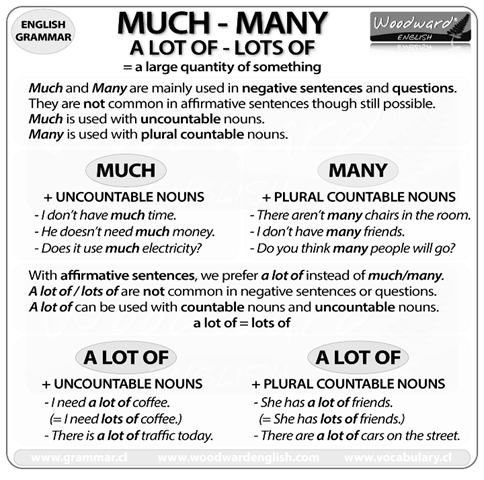
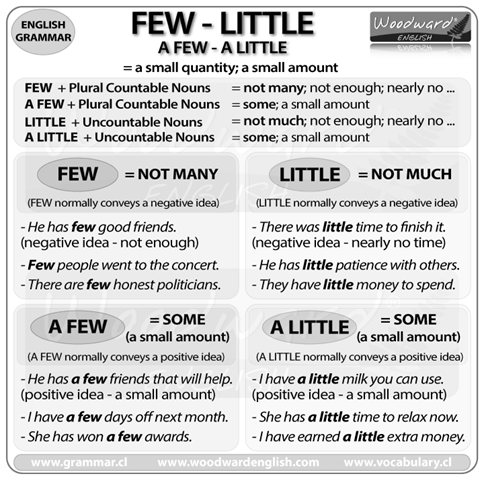
A lot of vs. Lots of
A lot of and lots of are used to express that there is a large quantity of something.
We use a lot of in positive sentences, negative sentences and questions. This expression can be used with countable or uncountable nouns.
• There are a lot of dogs in the street. (Countable noun)
• I have a lot of time to answer your questions. (Uncountable noun)
• I saw a lot of people waiting in the queue. (Countable)
• We did have a lot of fun, didn't we? (Uncountable)
We use lots of in positive and negative sentences, however it is more informal. It can be used with countable or uncountable nouns, and occasionally in questions.
• We have lots of time to catch the plane, let's relax. (Uncountable noun)
• There are lots of people in the queue today. (Countable)
• Oh my, you have spent lots of money on clothes! (Uncountable)
• I have lots of questions. (Countable)
She has a lot of money = She has lots of money
Much vs. Many
Much and Many are used to express that there is a large quantity of something.
Much and Many are used in negative sentences and questions.
Many is used with countable nouns
Much is used with uncountable nouns.
• I don't have many CDs in my collection. (Countable noun)
• They don't have much money to buy a present. (Uncountable noun)
• How many brothers do you have? (Countable noun)
• Is there much milk in the fridge? (Uncountable noun)
Note: we almost never use Much and Many in positive sentences, we almost always use a lot of or lots of.
I have much money. (Incorrect because the sentence is positive / affirmative)
I have a lot of money. (Correct)
With the word "times" we use many times more than a lot of times / lots of times. It sometimes means frequently or often.
• That is my favourite book. I've read it many times.
• Don't worry, I've done this many times.
• We have stayed at this hotel many times over the years.
Few vs. Little
We use a few and a little to suggest a small quantity or not much of something.
A few is used with countable nouns (= some; not many)
A little is used with uncountable nouns (= some; not much)
• There are only a few days left until Christmas. (Countable noun)
• I have a few crazy friends. (Countable noun)
• I would like a little milk for my coffee. (Uncountable noun)
• There is little hope of finding your wallet. (Uncountable noun)
While Few and Little usually have negative meanings, especially when used with very.
• He is sad because he has few friends. (Countable noun)
• There are few honest politicians. (Countable noun)
• There is little hope of finding your wallet. (Uncountable noun)
• They have very little knowledge about politics. (Uncountable noun)
So … that, Such … that
a) to show a fact (usually with a result or consequence)
• Pamela Ander's feet are big.
(Expresses a fact).
• Pamela Ander's feet are so big that she can't find shoes her size.
(Emphasizes that you feel strongly about the size of her feet).
b) to show extreme feelings or an opinion about something
• George Bushoff is an idiot.
(Merely a statement of fact/opinion).
• George Bushoff is such an idiot that he doesn't even know the capital of his own country.
(Emphasizes the speaker's opinion of the intensity of George Bushoff's idiocy).
SO with adjectives and adverbs
so + adjective/adverb + that + result
• The teacher speaks so clearly that everyone can understand her.
• The sun was so strong that they got burned within 15 minutes.
SUCH + Nouns
such + a + (adjective) + singular noun + that + result
(It is common to put an adjective before the noun)
• He is such a tight person that he even reuses his servillettes.
• Christopher is such a handsome man that all the ladies want him.
• She had such a long speech that everyone stopped paying attention to her.
such + plural/uncountable noun + that + result
• She has such big feet that she has to buy special shoes.
• Woodward Restaurant has such good food that it's always full of people.
SO / SUCH in exclamations
In exclamations we drop the word 'that' and use:
i) such + noun (singular/plural)
ii) so + adjective
• You are such an idiot! (noun)
• Celebrities have such weird tastes! (noun)
• You are so stupid! (adjective)
• It's so sunny outside! (adjective)
Such-and-such
This is used to talk about a particular type of person or thing that doesn't need to be specified. It is an unstated generic placeholder.
• People from such-and-such areas tend to be wealthy.
• If you do such-and-such a job, you will become famous.
Very and Too + adjective
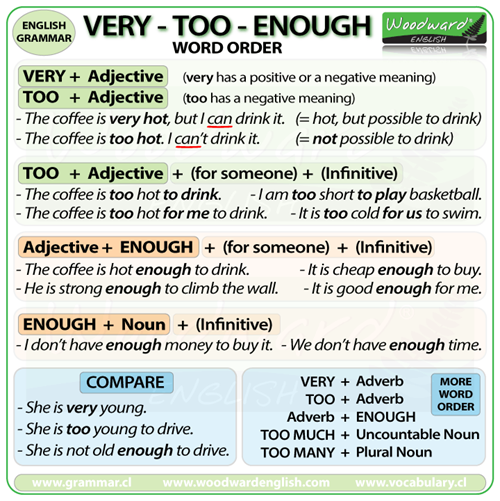
1. The exam is very difficult, but Jim can complete it.
2. The exam is too difficult. Jim can't complete it.
Very difficult = it is difficult but possible for Jim to complete the exam.
Too difficult = It is impossible for Jim to complete the exam.
Remember that Too implies a negative result.
Too + adjective + infinitive
• Alex couldn't play basketball because he was too short.
• Alex was too short to play basketball.
• We are too tired to go to the gym.
• Mary was too ill to finish her food.
Too + adjective + for (someone) + infinitive
• I can't walk to Valparaiso because it is too far.
• Valparaiso is too far for me to walk.
• It is too late for me to go out.
• The soup is too cold for Tim to eat.
• The price of the ticket is too expensive for Mike to fly to Europe.
Enough + noun
Enough (pronounced "enuff")
Enough = sufficient
• There was enough food for everybody at the party.
• I had enough money to pay for dinner with my girlfriend.
• Is there enough time to finish the test?
Adjective + Enough
• She is pretty enough for everybody to notice her. (Everybody notices her because she is very pretty.)
• My friend lives close enough to my house to walk.
• Last summer it was hot enough to go swimming every day.
Enough + infinitive
• When she lost her dog, it was enough to make her cry.
• He was sick enough to stay home from work today.
• I arrived at the airport early enough to make my flight to New York.
SO is used to show agreement with positive statements.
SO + Auxiliary/Be + Subject (pronoun)
The Auxiliary (or To Be/Have) needs to agree with the verb tense in the original statement.
It is similar to using TOO at the end of a sentence.
| Person A | Person B | |
|---|---|---|
| I am happy. | So am I. | = I am happy too. |
| I'm going to Brazil in the summer. | So am I. | = I am going to Brazil too. |
| You look nice today. | So do you. | = You look nice too. |
| Stephanie has a new boyfriend. | So does Mary. | = Mary has a new one too. |
| We went to the concert last night. | So did I. | = I went to the concert too. |
| I would love a coffee right now. | So would I. | = I would love a coffee too. |
| He will win a prize. | So will I. | = I will win one too. |
| They have finished their homework. | So have I. | = I have finished too. |
| I can speak two languages. | So can I. | = I can speak two too. |
| He should study more. | So should I. | = I should study more too. |
| We could see the mountains. | So could we. | = We could see them too. |
| My brother had eaten too much. | So had I. | = I had eaten too much too. |
Sometimes you can use So + Auxiliary + Subject as a continuation of the first part of the sentence.
• John can sing well and so can his brother.
(= John can sing will and his brother can sing well too)
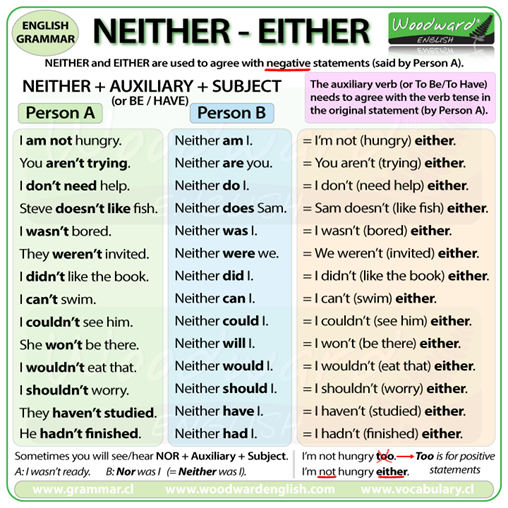
NEITHER
Neither is used to show agreement with negative statements.
Neither + Auxiliary + Subject (pronoun)
The Auxiliary needs to agree with the verb tense in the original statement.
It is similar to using either at the end of a sentence, although Neither is more commonly used, especially in spoken English.
A: I don't understand Spanish.
B: Neither do I. (= I don't understand Spanish either.)
A: I cannot swim.
B: Neither can I. (= I can't swim either.)
Sometimes people respond Me Neither instead of Neither + Auxiliary + Subject though this is very informal spoken English.
| Person A | Person B | |
|---|---|---|
| I am not hungry. | Neither am I. | = I'm not hungry either. |
| I'm not going to quit. | Neither am I. | = I'm not going to quit either. |
| They don't speak French. | Neither do I. | = I don't speak French either. |
| Stephanie doesn't eat meat. | Neither does Mary. | = Mary doesn't eat meat either. |
| Mary didn't go to the party. | Neither did I. | = I didn't go either. |
| I wouldn't like to do his job. | Neither would I. | = I wouldn't like to do it either. |
| He won't stop talking. | Neither will you. | = You won't stop either. |
| You haven't finished your meal. | Neither have you. | = You haven't finished either. |
| I can't reach the top shelf. | Neither can I. | = I can't reach it either. |
| You shouldn't talk in the movie. | Neither should you. | = You shouldn't talk either. |
| We couldn't hear him. | Neither could we. | = We couldn't hear him either. |
| I hadn't seen her before. | Neither had I. | = I hadn't seen her before either. |
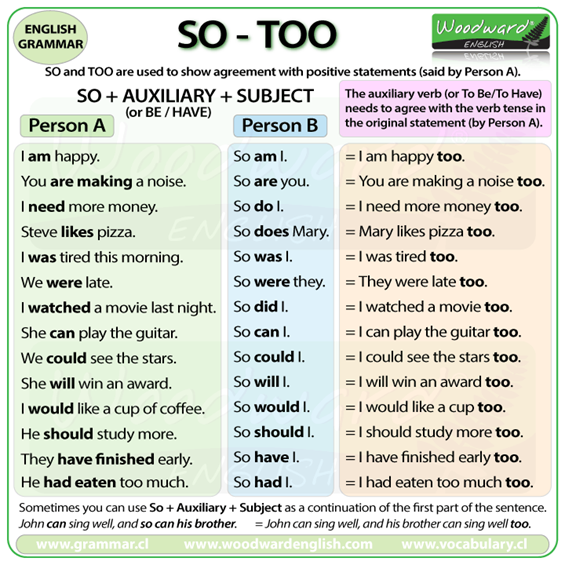
LIKE
LIKE = similar to; the same as.
The structure of the sentence is usually: VERB + LIKE + NOUN / PRONOUN.
• He speaks like a native speaker. (= He speaks similar to a native speaker)
• She looks like a supermodel.
• You look like him.
• Stop behaving like animals!
LIKE is mainly used as a comparison.
AS
AS = the way; in the same way; in the same condition
The structure of the sentence is usually: AS + SUBJECT + VERB.
• Nobody sings as she does. (= Nobody sings in the same way she does)
• They went to the party as they were.
• Please don't use my plate as an ashtray.
• As I said before, we have to get ready.
Notice how you could replace AS with 'the way' or 'in the same way' and maintain the same meaning.
It is common in American English to use LIKE instead of AS. However, it is generally considered informal to use it in this way.
• We play football like champions do.
Another use of AS is to say what the role/position/function of a person/thing is.
• He started work as a carpenter.
• She used the tapestry as decoration in her living room.
• I worked as an English teacher at the school.
LIKE vs. AS
Be careful, in similar sentences that use LIKE and AS, the meanings of each sentence are very different. For example:
• As your boss, I must warn you to be careful. (I am your boss - I am in the role of boss - REALITY.)
• Like your boss, I must warn you to be careful. (I am not your boss, but he/she and I have a similar opinion. - COMPARISON)
Another example with different meanings:
• This curry is hot, like all good curries. (Like + Noun Phrase)
= Similar to all good curries
• This curry is hot, as it should be. (As + Clause)
= Comparing to the way a curry should be. Notice how after AS there is a Subject + Verb (= a clause)
AS IF
In English we also use as if to make comparisons. However it has a few distinct characteristics to its use:
1. The verb after AS IF is always in the past subjunctive, no matter what tense the sentence is.
2. If the verb BE directly follows AS IF, we use were for all personal pronouns.
• He looks as if he knew the answer... but he doesn't.
(The verbs LOOKS indicates this sentence is in the present – but the verb after AS IF – knew - is in the past subjuntive).
• She walks as if she were a supermodel.
(The verb after AS IF – be – has been changed to were and not was).
• He boarded the airplane as if he were a seasoned traveller.
• He spends money as if he owned a bank.
Using AS + Adjective + AS
We use this structure to talk about people, animals or things which are equal in some way. This is a form of comparison.
• Chris is as tall as his brother.
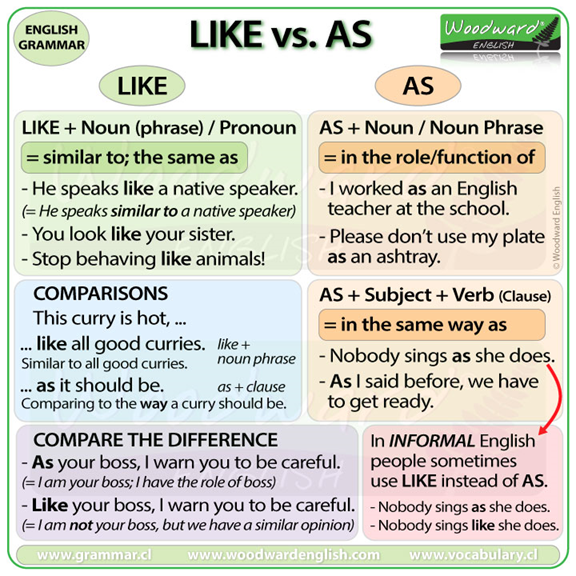
TRIẾT LÝ GIÁO DỤC
Lấy học sinh làm trung tâm, chúng tôi đề cao chất lượng học tập cách xây dựng nền tảng vững chắc, giúp người học chiếm lĩnh tri thức và ứng dụng những điều học được không những vào cuộc sống hàng ngày mà cả trong các lĩnh vực học thuật và nghề nghiệp khác.
ĐĂNG KÝ TƯ VẤN
